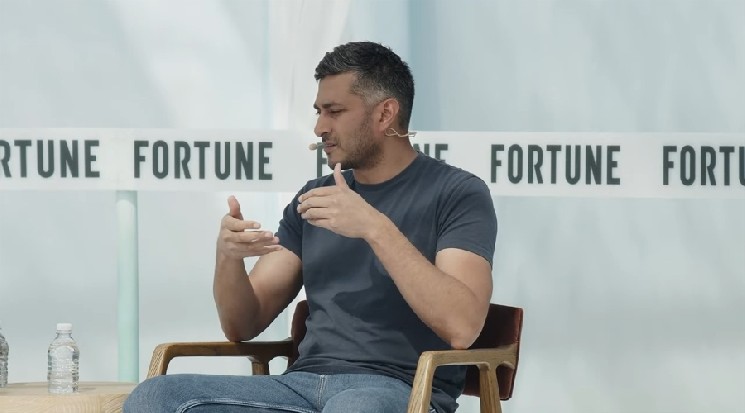Kraken’s co-chief executive officers drew a clear line between the exchange’s tokenized stock business and competitors that offer digital stocks of private companies, arguing that Robinhood’s approach is fundamentally flawed and a risk for investors.
Arjun Sethi has squarely rejected the increasingly popular idea of tokenizing shares in private companies, warning that investors face serious problems when trying to exit such positions.
“Vlad’s claims are flawed,” Sethi said in an interview with the Financial Times, referring to Robinhood CEO Vlad Tenev. He said tokenizing the shares of private companies is a “terrible idea.”
Robinhood faced criticism earlier this year when it launched a tokenized representation of OpenAI stock in Europe, even though the AI company had not authorized the offering. OpenAI has publicly distanced itself from the product, stating that the tokens do not represent actual company capital and warning that any transfer of OpenAI ownership requires company approval.
(#Highlighted link#)
The controversy highlights the liquidity and resale limitations inherent in private company stocks, and these issues make tokenization particularly problematic, Sethi said. Unlike publicly traded stocks, which benefit from ongoing market and regulatory oversight, privately placed securities often have transfer restrictions and a limited pool of buyers.
Robinhood CEO Vlad Tenev. Photo: Wikimedia Commons
But Tenev has a very different view, saying in a recent interview with Bloomberg Wealth: “The big tragedy is that most of the interesting valuations and exposure today are in the private markets. It’s unfortunate that exposure is so difficult to get in the US.”
Kraken is taking a more cautious path by limiting its tokenized stock offering to established publicly traded companies to avoid regulatory backlash. The platform currently offers 60 assets, including Tesla, Apple and GameStop stocks, with plans to expand to 1,000 popular stocks.
Public equity tokens gain momentum
Sethi’s comments came as Kraken reported that the xStocks platform, which offers tokenized versions of U.S.-listed stocks, has surpassed $5 billion in trading volume.
Each tokenized share is backed on a 1:1 basis by the underlying assets held by a European regulated custodian through the exchange’s partnership with Swiss company Backed Finance.
The platform enables 24/7 trading of US stocks across multiple blockchains including Solana, BNB Chain, TRON, and Ethereum, freeing you from traditional market hours. Users can move their holdings between compatible platforms or store them in self-custody wallets. This is a feature not available with traditional brokerage accounts.
“With xStocks, we’re not launching something new; we’re unlocking something fundamental,” Sethi said. “For the first time, people around the world can own and use shares of tokenized stocks the same way they spend money.”
The service has gained traction in markets such as South Africa and Argentina, where DeFi technology allows Kraken to offer stocks without additional fees charged by intermediaries. A fee that can increase the purchase price of a stock by 10% to 15% above its actual price.
UK restrictions block access to platform
But Sethi, who shares the chief executive role with David Ripley, said UK customers will not have access to Kraken’s tokenized stock platform or about 75% of the crypto products available to US users. The restrictions stem from the Financial Conduct Authority’s Financial Facilitation Scheme, which was introduced at the end of 2023.
In an interview with the Financial Times, Sethi compared the experience of visiting a UK cryptocurrency website to encountering a warning on a cigarette pack. “In the UK today, if you go to any crypto website, including Kraken, you’re presented with the equivalent of a pack of cigarettes: ‘Use this and you’ll die,'” he said.
The FCA’s requirements require crypto platforms to display prominent risk warnings, prohibit investment incentives, and require customers to complete multiple verification steps before allowing transactions. Sethi argued that the multi-step process harms consumers in a market where timing is critical.
“It’s even worse for the consumer because the transaction has to happen quickly,” he told the newspaper, adding that the 14-step process makes disclosure counterproductive.
The comments came days after Kraken boss Mr Sethi met with UK policymakers to discuss the development of digital asset innovation in the UK.
The regulator is firmly standing
The FCA defended its approach, saying the rules would enable customers to understand both the benefits and risks before investing. A spokesperson said customers must answer questions before receiving financial promotions, but not all transactions face the same requirements.
“While some consumers may make an informed decision that investing in cryptocurrencies is not suitable for them, that is working as our rules were intended,” the regulator said.
Britain’s watchdog has stepped up enforcement of promotion rules this year. In October, the FCA took legal action against cryptocurrency exchange HTX, which is linked to billionaire Justin Sun, alleging that the platform was not complying with financial facilitation requirements. Sun has invested millions of dollars in digital asset ventures linked to the Trump administration.
Global securities regulator IOSCO has criticized the tokenization of assets due to the uncertainty around ownership and counterparty risks posed by token issuers.
Kraken, founded in 2011 and ranked among the world’s 15 largest exchanges by trading volume, is preparing to list in New York, although Sethi declined to discuss the timing. The exchange is reportedly seeking to raise $500 million at a valuation of $15 billion ahead of an initial public offering in 2026.


